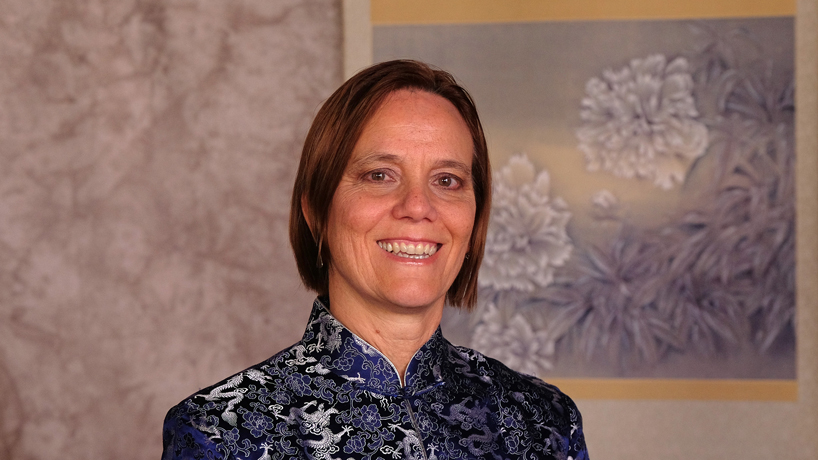
Professor Susan Brownell, an anthropologist and expert on Chinese sport and Olympic Games, was recently named a member of the National Committee on U.S.-China Relations. (Photo by August Jennewein)
The National Committee on U.S.-China Relations exists to promote understanding and cooperation between the United States and China with the belief that a productive relationship serves both American and global interests.
Its membership includes more than 700 prominent Americans from across the country who represent different viewpoints but share a desire to increase public knowledge about China and developments therein because of its importance to the future of both countries.
Susan Brownell, a professor of anthropology in the Department of History at the University of Missouri–St. Louis and an expert in Chinese Sports and the Olympic Games, was recently welcomed into the committee’s ranks.
Historian Jeffrey N. Wasserstrom, with whom Brownell collaborated on the book “Chinese Femininities/Chinese Masculinities: A Reader,” nominated her for membership. She’d previously been an invited speaker at several NCUSCR events at the organization’s headquarters in New York and locally that were co-hosted by UMSL Global.
“It’s just really important to have voices for China,” Brownell said. “That doesn’t necessarily mean you’re always an advocate for what China’s doing, but to help explain China.”
That might be more critical than ever with the relationship between the world’s two leading economic powers becoming more strained in the past five years than perhaps at any time since the 1970s.
The two have been enmeshed in a trade war that began in 2018, and the United States declared China a currency manipulator in 2019. Tensions have also increased because of U.S. support for protestors in Hong Kong in 2019 and the coronavirus, which originated in the Chinese city of Wuhan and spread across the globe in 2020.
Last year, the United States imposed a diplomatic boycott of the Olympic Games, which were held in Beijing.
“The perception of China among many of our politicians, and the media coverage, are so negative that they’re just not helpful,” Brownell said. “They’re just so biased. We really need much more reasoned voices trying to explain the way things really are.”
Understanding of China, its culture and its customs has never been in abundance in the United States. The country lies on the edge of Asia, about as far away from Europe and the U.S. as possible, and it developed its own history and culture separate from the West.
The establishment of the People’s Republic of China under the leadership of Mao Zedong and the Chinese Communist Party after years of intermittent civil war in 1949 left it further isolated from the Western world. More than 20 years passed from that point before an American delegation set foot in China.
The NCUSCR was responsible for helping re-open dialogue between the two countries when it facilitated a visit to Beijing by members of the American table tennis team, accompanied by a group of journalists, on April 10, 1971, in what was known as ping-pong diplomacy.
“That’s particularly meaningful for me because I’m an expert in Chinese sports and Olympic Games,” Brownell said.
That paved the way for President Richard Nixon’s visit to China in 1972 and helped set the stage for the U.S. to formally recognize the People’s Republic of China and establish diplomatic relations in 1979.
Brownell was among the early wave of researchers to visit China and conduct ethnographic research in the 1980s while pursuing her PhD at the University of California, Santa Barbara. She spent the 1985-86 academic year at Beijing University studying Chinese language.
Once a nationally ranked track and field athlete and Olympic hopeful as an undergraduate at the University of Virginia, Brownell also wound up competing for Beijing at the 1986 Chinese National College Games, where she set a national record and won a gold medal in the heptathlon.
Brownell traces her interest in China to hearing the stories her grandmother would tell about her great-grandfather Earl Brewer, the former Mississippi governor, who represented the Chinese community in the Mississippi Delta in a challenge to school segregation in the 1920s. The case, known as Gong Lum v. Rice, reached the U.S. Supreme Court, which denied the appeal and upheld the authority of Mississippi to segregate schools by race in 1927.
She returned to Beijing Sport University for a year of doctoral research in 1987 and has made numerous trips to the country to conduct research since joining the UMSL faculty in 1984.
Brownell spent a year in Beijing in the lead-up to the 2008 Olympic Games and returned to Shanghai in 2010 for the World Expo. She had planned to go back to China ahead of the 2022 Olympic Winter Games, but the COVID-19 pandemic derailed those plans.
Her perspective on China and the Games remained in-demand in American and international media coverage both before and during the Games.
As a member of the NCUSCR, Brownell will have the opportunity to attend the annual members meeting as well as other events throughout the year and will now have access to the committee’s staff, and she’s looking forward to connecting with other China experts and scholars.














